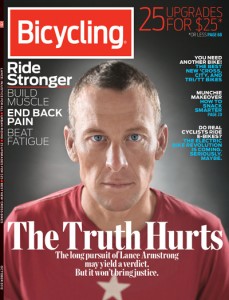The Lance Armstrong news saga ceased to become a “sports story” more than 10 years ago, when in 2005 the allegations of blood doping came fully into light. It became much larger.

Lance Armstrong, “The Truth Hurts”.
I could put Lance Armstrong’s career into a 50:50 mixture of cycling to “spin.” By spin, I am not referring to the exercise we do in our gyms on stationary bikes. I am referring to the public relations dance that the guilty often do when they try to cover their tracks with denial, contrition, obfuscation and innuendo. The spin part includes songs such as “Well, everyone does it!” or “It was legal to do it back then.”
In Lance’s case, everyone wasn’t doing it and despite what Lance believed, activities such as blood doping were never legal; the rules were quite clear.
Lance Armstrong was much more than a cyclist of course; he was an industry. He was a naturally gifted athlete (to be sure) who cut a lot of corners and in doing so, he cheated, bullied and lied to making millions of dollars. His foundations, endorsements and mega-million dollars in earning were built on a foundation of intimidation and an absence of anything ethical.
Bad Choices Catching Up
Despite his hand-wringing apologies on nationally-televised shows such as Oprah, Armstrong was never really penalized for his false ethics. Things have finally changed. In an article appearing in the Dallas Business Journal (February 16, 2015) entitled: “Arbitration panel orders Lance Armstrong to pay Dallas company $10M,” we learn that:
“Lance Armstrong has lost an arbitration ruling and has been ordered to repay $10 million to a Dallas promotions company…According to media reports, SCA paid champion cyclist Armstrong roughly $12 million in bonuses during his career, which included seven Tour de France titles…Armstrong was stripped of his cycling titles when he and his U.S. Postal Service teams were found to have used performance-enhancing drugs.”
SCA, the promotions company that arranged numerous deals for Armstrong, bought into Lance’s adamant defense of his virtue and purity. Over time, the promotions company paid him millions of dollars. They sued to reclaim their money and they won most of it back.
There is a price for poor ethics, and that is what I would like to talk about today.
Sooner or later bad choices catch up. Is this some kind of immutable natural law? No, it is not. It is common sense that so many unethical people fail to understand.
When an athlete such as Lance Armstrong must maintain an empire by cheating, bullying and using intimidation, he naturally creates enemies and a false platform for his everyday personal, athletic and business life. It is impossible to maintain.
Let’s take it out of athletics completely and think of recent cases where bad choices led to major downfalls. We only need to mention these scandals by name or company: Madoff, General Motors (safety violations), Lehman Brothers, Enron and Cosby. The list is far from comprehensive. I am sure you can come up with several more in the next few minutes.
In looking at each scandal, whether a corporation or personally disgusting ethics, there was a time that each entity stood at a crossroads; the choice between a good choice and a bad choice. In this ethical blog I write each week, I can go back over hundreds of scandals and we can pinpoint a moment when someone saw the opportunity to do something decent and ethical or to do harm. Doing ethical “harm,” is not victimless.
Who did Armstrong hurt?
It is easy for people to deceive themselves. This is classic fan behavior where the fan will excuse a football player for slapping around a girlfriend or whipping a toddler with a stick. This is the behavior of a zealous employee who will take the witness stand to defend an unscrupulous CEO whom the employee knows is unscrupulous.
Lance Armstrong hurt millions of cancer patients and cancer survivors who believed in him and his organization; he hurt his sponsors who actually believed he was competing the right way; he hurt his teammates, family and friends.
Then there is the matter of Armstrong himself. He is a man without credibility. It was only a week or two ago that I wrote a blog about Lance Armstrong’s girlfriend covering for him as he got drunk at a party in Aspen and hit two parked cars. She took the blame for him; worse, he let her.
I don’t know what Madoff thinks about as he lives the rest of his life behind bars or Cosby in the quiet of his dressing room or the former executives at Enron and hundreds of other companies. I wonder if they think about choices and consequences. It is easy to imagine they don’t. I am willing to bet everything I have learned, taught and lectured that they do; and it haunts them and every fiber of their body.
YOUR COMMENTS ARE WELCOME!

